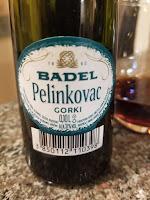 Badel Pelinkovac Gorki is the oldest and most famous Croatian herbal liqueur that was first crafted by Franjo Pokorny in 1871 at the Zagreb Liquor Factory in Zagreb. This factory had been founded eleven years earlier (hence Badel 1862) and Pokorny had purchased it to expand his production of liqueurs and Sljivovica. Pokorny was such a tenacious salesman, that he was able to expand sales throughout Europe - particularly to the Hapsburgs in Vienna and the French Imperial court of Napoleon III - the nephew of Napoleon I and the last French monarch.
Badel Pelinkovac Gorki is the oldest and most famous Croatian herbal liqueur that was first crafted by Franjo Pokorny in 1871 at the Zagreb Liquor Factory in Zagreb. This factory had been founded eleven years earlier (hence Badel 1862) and Pokorny had purchased it to expand his production of liqueurs and Sljivovica. Pokorny was such a tenacious salesman, that he was able to expand sales throughout Europe - particularly to the Hapsburgs in Vienna and the French Imperial court of Napoleon III - the nephew of Napoleon I and the last French monarch. In 1886, the Zagreb Liquor Factory expanded and added the Patria distillery to its company. Patria was making fine liqueurs and its most famous Patria Medicinal Brandy which was sold in pharmacies and is known today as Badel Brandy. In 1947, after World War II, three distilleries combined to form the Zagreb factory of Liqueurs and Wines. These were Pokorny's Zagreb Liquor Factory and Patria distilleries and the A. A Baker & Co. Two years after this the Arko factory (a family operation that originally opened in 1861 and produced sparkling wines, brandy, and liqueurs) is added to the conglomerate. In 1950, the factory was renamed Marijan Badel. In 1991, with more mergers, a new company is formed: Badel 1862.
Badel Pelinkovac is produced according to a traditional maceration method where selected curative herbs from the Velebit mountain, with the dominant herb Pelin (lat. Artemisia Absinthium or in English Wormwood), are soaked in high-quality grain alcohol and then left to age in wooden barrels for several weeks. A percentage of the produced macerate is then distilled in copper pot stills and finally, the distillate and the macerate are blended into Badel Pelinkovac. In fact, as we learned from master blender Vesna Jurak in the video below, Badel 1862 employs the 3rd oldest pot still in the world. The final alcohol content ranges from 28% to 35% by volume.
The spirit starts with a savory pine tar and mint aroma, is slightly bitter, and then transitions to the sweeter side. It's minty throughout with some orange rind and a lengthy finale.
